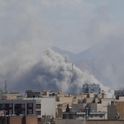The Yemen war has been a dramatic foreign policy departure for Saudi Arabia. This unprecedented military intervention is just one of several areas of policy that have been radically altered since King Salman came to power in January 2015 and installed his son Mohammed as defence minister and then crown prince. Their decision to lead a military intervention in Yemen was something unprecedented for a country more accustomed to relying on the military protection of the US. But it reflects longstanding, pent-up anger and frustration in Saudi Arabia at the perceived rise of Iran in the Middle East and the failure of either Western leaders or previous Saudi ones to come up with any effective strategy to counter it.
Traditionally the Gulf countries have relied on western powers—first Britain and then the US—to guarantee their security against external threats, epitomised by the US-led liberation of Kuwait in 1991. But in recent years Gulf leaders have become concerned that the US will not necessarily defend them against the spectrum of risks that they perceive to their security. These are not only conventional external military threats, but hybrid threats where external enemies interact with transnational and domestic movements—which is largely how Gulf rulers saw the Arab spring uprisings from Egypt to Bahrain, even as many westerners sympathised with them as democracy movements.
Saudi elites were disturbed by Obama’s acceptance of the Arab spring, and furious at what they saw as his accommodation of an expansionist Iran through the nuclear deal. The international group that negotiated the Iran nuclear deal saw it as a stepping stone to further diplomacy that could help curb Iran’s support of militias in the region; the Saudis saw it as quite the opposite, thinking the West was giving Iran a green light to expand in Syria, Iraq and elsewhere under the guise of fighting ISIS.
In this febrile context, the 2014 coup by the Houthi-Saleh alliance was seen by Saudi leaders through the prism of their overarching concern about Iran: they see Iran as successfully expanding its hard power across the region by utilising opportunities in failed or collapsing Arab states, and they perceived Iran’s support for the Houthis as an indication that their rival was coming to threaten them in their own backyard. The decision to go to war was intended as a message to Iran, and a demonstration to the West, that none of these players could maintain the old assumptions that Saudi Arabia would spend lavishly on arms but never use them. Mohammed bin Salman has a preference for sudden, spectacular actions that signal a break with the past and indicate that the old patterns of Saudi behaviour cannot be taken for granted.
The war in Yemen did indeed change calculations about the Saudi role in the region. But it is unlikely to herald further military interventions any time soon—despite a lot of bluster about possible Saudi intervention against Assad and despite the more recent speculation that Saudi Arabia might start a war with Lebanon. The fact is that the Yemen war has not met Saudi objectives. Saudi officials who briefed diplomats at the start of the war said it would last just a few weeks.
The war has demonstrated a newfound Saudi willingness to use force, but the country has not shown equivalent capacity to implement a political strategy or bring the war to a decisive close. While its Western allies have continued to support it, its reputation has been damaged by the civilian casualties and humanitarian disaster, just at a time when it is trying to rebrand itself and win investment. MBS could show decisive leadership by calling a ceasefire, declaring victory and marshalling his many foreign allies in support of a political deal acceptable to Saudi Arabia—rather than continuing with an approach from which Yemen is losing a great deal and Saudi Arabia is gaining very little.
Saudi Arabia's intervention in Yemen is unprecedented—and flawed
The war has demonstrated a newfound Saudi willingness to use force, but the country has not shown equivalent capacity to implement a political strategy
December 09, 2017

YEMEN, Sana'a: A thick cloud of black smoke rises above the Yemeni capital of Sana'a as Saudi Arabia continues its military intervention. Photo: PA












